good and evil
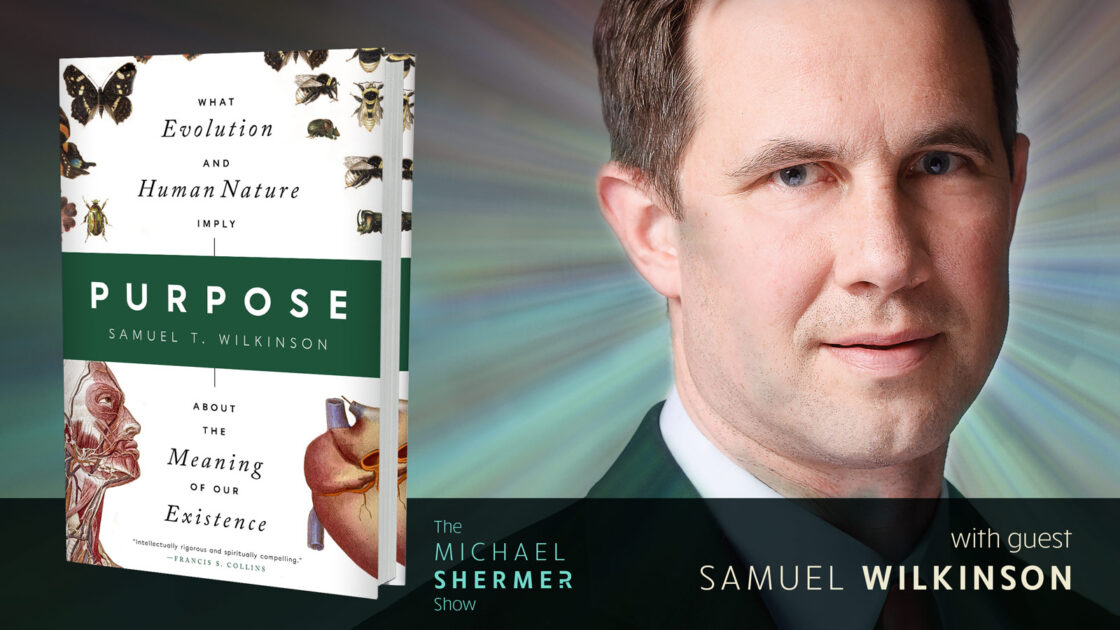
Shermer and Wilkinson discuss: • evolution: random chance or guided process? • selfishness and altruism • aggression and cooperation • inner demons and better angels • love and lust • free will and determinism • the good life and the good society • empirical truths, mythic truths, religious truths, pragmatic truths • Is there a cosmic courthouse where evil will be corrected in the next life? • theodicy and the problem of evil: Why do bad things happen to good…
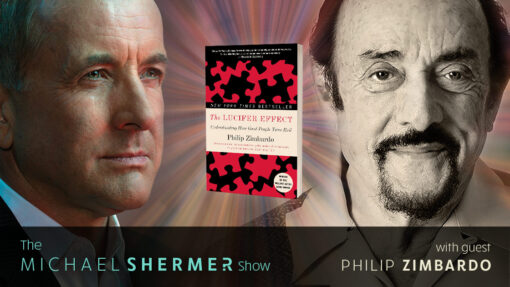
August 15 marks the 50th anniversary of day one of the Stanford Prison Experiment — one of the most controversial studies in the history of social psychology. In episode 200, Michael Shermer speaks with renowned social psychologist and creator of the Stanford Prison Experiment Philip Zimbardo, exploring the mechanisms that make good people do bad things, how moral people can be seduced into acting immorally, and what this says about the line separating good from evil.
In episode 200, Michael Shermer speaks with renowned social psychologist and creator of the Stanford Prison Experiment Philip Zimbardo, exploring the mechanisms that make good people do bad things, how moral people can be seduced into acting immorally, and what this says about the line separating good from evil.
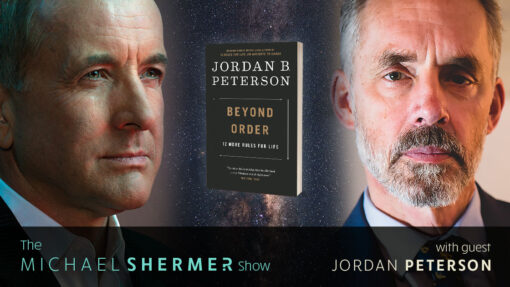
Michael Shermer and Jordan Peterson discuss: the balance between chaos and order • Maps of Meaning • truths: objective, subjective, historical, political, religious, and literary • why all countries aren’t democracies • the appeal of populist, authoritarian leaders • the danger of assessing according to race, sex, class and power • oppression-redemption myths • how Peterson’s dark dreams and mental health issues inform his worldview as tilting toward the darker side of humanity.
In episode 174, join Michael Shermer and Jordan Peterson (bestselling author of 12 Rules for Life) for this extraordinary conversation based on Peterson’s new book Beyond Order. PLUS: Save 40% on new digital subscriptions to Skeptic Magazine via Pocketmags.com, now through April 27, 2021!
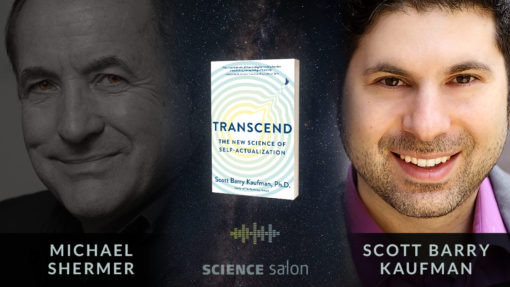
In Science Salon # 111 Michael Shermer speaks with psychologist Scott Barry Kaufman about his book Transcend: The New Science of Self-Actualization. Kaufman picks up where Abraham Maslow left off, unraveling the mysteries of his unfinished theory of transcendence, and integrating these ideas with the latest research on attachment, connection, creativity, love, purpose and other building blocks of a life well lived.
In Science Salon # 111 Michael Shermer speaks with psychologist Scott Barry Kaufman about his book Transcend: The New Science of Self-Actualization. Kaufman picks up where Abraham Maslow left off, unraveling the mysteries of his unfinished theory of transcendence, and integrating these ideas with the latest research on attachment, connection, creativity, love, purpose and other building blocks of a life well lived.
In Science Salon # 82, Michael Shermer speaks with Phil Zuckerman about his book that launches today — What it Means to be Moral: Why Religion is Not Necessary for Living an Ethical Life. PLUS, the latest issue of Skeptic magazine (24.3) launches today in print and digital editions.
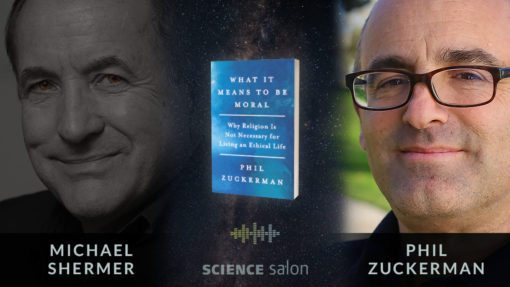
By deconstructing religious arguments for God-based morality and guiding readers through the premises and promises of secular morality, Zuckerman argues that the major challenges facing the world today―from climate change and growing inequality to religious support for unethical political policies to gun violence and terrorism―are best approached from a nonreligious ethical framework.
The term “witch-hunt” is used today to describe everything from political scandals to school board shake-ups. Long before the Salem witch trials, women and men were rounded up by neighbors, accused of committing horrific crimes using supernatural powers, scrutinized by priests and juries, and promptly executed. The belief in witchcraft — and the deep fear of evil it instilled in communities — led to a cycle of accusation, anger, and purging that has occurred repeatedly in the West for centuries…
In this debate, on what are arguably two of the most important questions in the culture wars today — Is Religion a Force for Good or Evil? and Can you be Good without God? — the conservative Christian author and cultural scholar Dinesh D’Souza and the libertarian skeptic writer and social scientist Michael Shermer, square off to resolve these and related issues, such as the relationship between science and religion and the nature and existence of God.
In this week’s eSkeptic, Harriet Hall, M.D. (Skeptic magazine’s resident expert on all matters medical) reviews Jerome Groopman’s book How Doctors Think. PLUS, Shermer appears on CNN’s Glenn Beck show to discuss 9/11 conspiracy theories; Dinesh D’Souza and Michael Shermer debate “Is Christianity Good for the World?”.
Why do people dodge responsibility when things fall apart? Why the parade of public figures unable to own up when they screw up? Why the endless marital quarrels over who is right? Why can we see hypocrisy in others but not in ourselves? Are we all liars? Or do we really believe the stories we tell? Renowned social psychologist Dr. Carol Tavris takes a compelling look into how the brain is wired for self-justification…
In this week’s eSkeptic, Jennifer McKevitt reviews by Philip Zimbardo’s book entitled The Lucifer Effect: Understanding How Good People Turn Evil.
How is it possible for ordinary, average, even good people to become perpetrators of evil? Dr. Zimbardo, Professor of Psychology at Stanford University, ran the famous “Stanford Prison Experiment” in the late 1960s that randomly assigned healthy, normal intelligent college students to play the roles of prisoner or guard in a projected 2 week-long study that he was forced to terminate after only 6 days because it went out of control, with pacifists becoming sadistic guards, and normal kids breaking…
In this week’s eSkeptic, Michael Shermer tries out some new ideas at a free lecture on evolutionary economics; and Dr. Philip Zimbardo lectures at Caltech on the topic of The Lucifer Effect: Understanding How Good People Turn Evil.
In this week’s eSkeptic, we announce: Julia Sweeney’s new CD Letting Go of God, now available at shop skeptic; James Randi compiles a remarkable line-up of speakers for The Amazing Meeting 5; and Michael Shermer sheds some light on Kramer’s Conundrum, in an LA Times op-ed on racism.
The God Delusion, by the Oxford University evolutionary biologist Richard Dawkins, is based on his controversial BBC documentary, The Root of All Evil? Dawkins presents his view of religion as a cultural virus that, like a computer virus, once downloaded into the software of society corrupts almost all programs it encounters.
Philosopher and evolutionary psychologist David Livingstone Smith elucidates the essential role that deception and self-deception have played in human — and animal — evolution and shows that the very structure of our minds has been shaped from our earliest beginnings by the need to deceive…
In this week’s eSkeptic, Michael Shermer recounts his experience appearing on the Art Bell Show.
NEXT →













